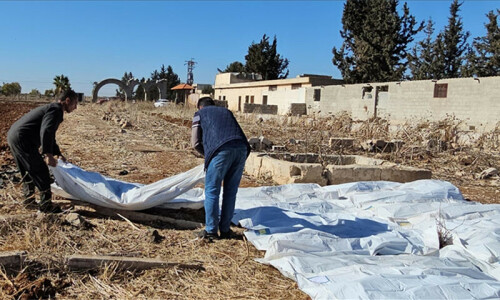PESHAWAR: Advocating for early resolution of the longstanding net hydel profit issue, speakers in a seminar here on Friday urged the Centre to either pay Rs1.5 trillion in cash to Khyber Pakhtunkhwa in line with the Kazi committee’s formula or hand over Wapda’s power houses to it.
The event on net hydel profit was organised by the National Think Tank - Good Governance Forum in collaboration with the Institute of Management Sciences Peshawar.
National Think Tank chairman Dr Syed Akhtar Ali Shah, a former home secretary, highlighted the NHP’s legal aspects and its significance for the region’s economic landscape.
President of the Sarhad Chamber of Commerce and Industry Fuad Ishaq presented the local industry’s perspective on hydel prospects, highlighting the potential benefits for local businesses and the economy.
Experts float proposal to resolve hydel profit issue
Former adviser on energy and power Himayatullah Khan underscored the importance of optimising hydel resources for sustainable energy production.
Former governor Iqbal Zafar Jhagra stressed the need for strategic planning in harnessing hydel resources effectively.
Director of the Institute of Management Sciences Dr Usman Ghani said his organisation was committed to promoting discussions on topics that contributed to societal progress.
The speakers underscored the constitutional obligations regarding NHP and the pressing need for equitable resource distribution among provinces, especially KP.
They said Article 157 of the Constitution allowed the federal government to construct hydroelectric power houses with prior consultation from provincial governments, while Article 161(2) declared that net profits from hydroelectric power generation would be paid to the province where the power station was located.
The speakers said the Council of Common Interests endorsed the Kazi committee’s methodology for calculating net hydel profit in 1991.
The speakers said an arbitration tribunal, constituted in 2005, granted Rs110 billion to KP but Wapda petitioned against it in a civil court.
They added that the province received the amount in 2009 after negotiations between the chief minister and the prime minister.
The speakers said despite those constitutional provisions, the implementation of NHP had faced significant bottlenecks, leading to a sense of deprivation among provinces.
They said the payment of Rs6 billion was made in 1992 when KP’s budget had an outlay of Rs14 billion with the annual development programme totalling Rs4.8 billion.
The speakers said KP had received no NHP payments in the last five months.
They said in 2016, a memorandum of understanding was signed to increase NHP from Rs6 billion to Rs18 billion annually but the recent payments had been erratic, severely impacting the province’s financial health and development efforts.
The speakers said in 2016, an interim arrangement was made at Rs1.1 per unit with a five per cent indexation, increasing the annual NHP to Rs18.7 billion.
Published in Dawn, July 27th, 2024















































Dear visitor, the comments section is undergoing an overhaul and will return soon.